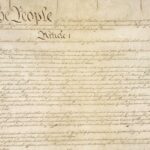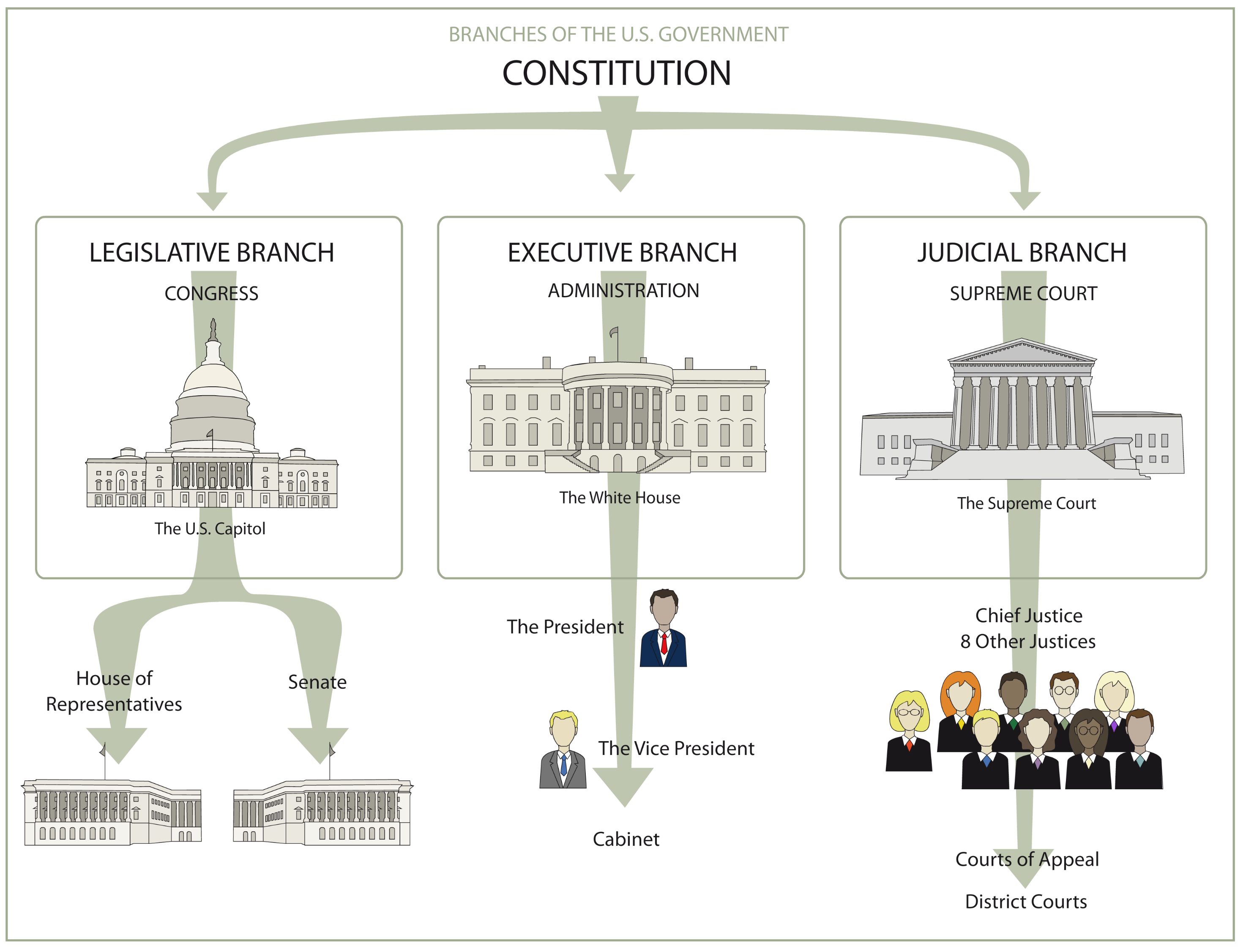The operating principles of a democracy include:
Popular Sovereignty
 “All power is vested in, and consequently derived from, the people,” — Virginia Declaration of Rights of 1776.
“All power is vested in, and consequently derived from, the people,” — Virginia Declaration of Rights of 1776.
“We the people of the United States, in order to form more perfect Union, establish Justice, insure domestic Tranquility, provide for the common defense, promote the general Welfare, and secure the Blessings of Liberty to ourselves and our Posterity, do ordain and establish this Constitution for the United States of America.” — 1789
“Whenever the political laws of the United States are to be discussed, it is with the doctrine of the sovereignty of the people that we must begin.” — Alexis de Toqueville, Democracy in America, 1835
Reality check: Political ideals are often not realized for all citizens. The US has never achieved perfect popular sovereignty, and even the concept of a right to vote has become a partisan issue in the US. Southern state governments continue to pass laws to suppress the votes of minority populations – African Americans especially. But many such attempts have been rejected through long-term, consistent, morally based, non-violent campaigns such as the voting rights movement.
Individual (natural) rights
“We hold these truths to be self-evident, that all men are created equal, that they are endowed by their Creator with certain unalienable Rights, that among these are Life, Liberty and the pursuit of Happiness.” –– US Declaration of Independence, 1776.
“The fundamental and original nature of humanity is that individuals are free.” — Miraj al-Suud ila nayl Majlub al-Sudan, Timbuktu, Library of Congress Ancient Manuscripts collection
“All human beings are born free and equal in dignity and rights. They are endowed with reason and conscience and should act towards one another in a spirit of brotherhood.” — Article 1 – United Nations Universal Declaration of Human Rights, 1948.
Historical note: The tradition of respect for natural rights (or human rights) is not confined to the US and Europe. Religions and ethical and systems throughout history, on every continent, have supported tolerance and human rights, although with varying degrees of success.
Reality check: Today, half the countries in the world ignore the UN Declaration of Human rights. Although it is not a binding treaty, it is the standard that today most effectively differentiates democracies from totalitarian and despotic governments.
Equal Justice under Law
Everyone is treated the same under the law. No one is above the law. This stems from ancient ideas about justice.
The “rule of law” is an ancient concept and one of the most important and hard-fought ideas in human history. The principle is that no one — not even a king — is above the law. Many wars and revolutions have been fought to preserve and extend the basic idea of equal justice, as we will see when we consider the history of free speech.
Analytical note: From the Constitutional point of view, the “law” is not just a set of rules that can easily be consulted. New circumstances require new interpretations all the time. But there are ongoing debates about this concept. Conservative scholars see a need to base Constitutional law on the “original intent” of the framers of the Constitution in 1789. Liberal scholars see the Constitution as a “living document” that can and should change with the times. Debates between these two schools of thought have underpinned questions about the rights of minority groups and free speech issues for many decades.
Due Process of the law
Due process is about maintaining respect for individual rights during a legal action. All levels of government must operate within the law and be fair to everyone while the legal processes take place.
Historical note: The origins of Due Process are in the Magna Carta of 1215 (Britain / UK). Due process for all American citizens is the main point of the 14th Amendment to the Constitution, passed in 1868 in aftermath of the Civil War and the emancipation of slaves in the southern states. This meant that protections of life and liberty were supposed to be extended to African Americans and other marginalized populations.
Lack of due process: Lynchings by mobs in America are one example of a lack of due process. Saudi Arabia’s mass executions and live dismemberments of dissidents are examples of denial of due process of law.
Constitutionality
In the US, the concept of constitutionality requires that a law is in harmony with the Constitution. In the area of human rights law, for example, this concept might involve the protection of rights by the Bill of Rights
Example: In New York Times v Sullivan case, decided in 1964, the Supreme Court said that a libel suit filed against the Times had to be judged against the “profound commitment” to the Constitutional guarantee of freedom of speech and press.
Separation of powers
 Checks & balances are created through separate branches of government. In the US, this is the Legislative, the Executive and the Judiciary. In parliamentary systems, the executive branch is formed from the legislative branch. For example, the Prime Minister of the United Kingdom (Britain) is a member of Parliament.
Checks & balances are created through separate branches of government. In the US, this is the Legislative, the Executive and the Judiciary. In parliamentary systems, the executive branch is formed from the legislative branch. For example, the Prime Minister of the United Kingdom (Britain) is a member of Parliament.
Historical note: The idea of a “separation of powers” that a system of checks and balances should help prevent any one branch of government from dominating the others or undermining democracy. It was conceived by Baron de Montesquieu, a French Enlightenment philosopher. In his book, Spirit of the Laws, Montesquieu said that, to most effectively promote liberty, these three powers must be separate and act independently. (Nat’l Conf of State Legislatures)
Federal supremacy (US)
Supremacy clause in U.S. Constitution (Article 6 ) means that states are bound by the U.S. Constitution, federal law and federal agency regulations.
Fourteenth Amendment (passed in 1868) makes the US Bill of Rights applicable to the states. This did not happen all at once. Instead, a gradual process of Constitutional Incorporation took place between the 1860s and the 1920s.
Stare decisis and the continuity of law (US)
Let the precedent stand. (Respect prior court decisions) This is a legal principle that provides stability and predictability by relying on precedents to guide opinions. Judges usually go by the precedent unless there is a good reason to overturn or modify it.
Example: When asked about Roe v Wade (the major decision legalizing abortion in 1973), candidates for Supreme Court in recent years have said that they were personally opposed to abortion but that the principle of stare decisis would mean that they would not try to overturn Roe v Wade. However, in 2022, the court took this principle as a secondary consideration in Dobbs v Mississippi Women’s Health Clinic,in which the court said: “Stare decisis is not an inexorable command … Some of the Court’s most important constitutional decisions have overruled prior precedents.”
Majority rule AND minority Rights
Democratic governments are based on the rule of the majority of the electorate (people with voting power), but there are instances where majorities have exercised tyrannical powers over minorities. This was a major issue in the formation of the US Constitution and Bill of Rights in the 1780s and 90s, as well as the United Nations Universal Declaration of Human Rights in 1948.
Everyone is entitled to all the rights and freedoms set forth in this Declaration, without distinction of any kind, such as race, colour, sex, language, religion, political or other opinion, national or social origin, property, birth or other status. Furthermore, no distinction shall be made on the basis of the political, jurisdictional or international status of the country or territory to which a person belongs, whether it be independent, trust, non-self-governing or under any other limitation of sovereignty.
Article 2, – United Nations Universal Declaration of Human Rights, 1948.
The tyranny of the majority can result in oppression of minority groups comparable to that of a tyrant or despot, argued John Stuart Mill in his 1859 book On Liberty.
Similarly, protection for Freedom of Speech and Press must include protection for unpopular ideas, not only the popular ones.
“Democracy is not the rule of the majority but the protection of the minority.” – Albert Camus.
Marketplace of ideas
Democracies rely on the marketplace of ideas.
- Justice Stephen Breyer noted in Reed v . Town of Gilbert (2015), that “whenever government disfavors one kind of speech, it places that speech at a disadvantage, potentially interfering with the free marketplace of ideas and with an individual’s ability to express thoughts and ideas that can help that individual determine the kind of society in which he wishes to live, help shape that society, and help define his place within it.”
2. Dissent has the practical effect of serving as a “social safety valve” and can lead to constructive social change. Repression, on the other hand, alienates the people, making reform impossible and increasing resentment and the likelihood of violence.
There are different concepts about how a free marketplace of ideas should function.
Political philosopher John Stuart Mill expressed absolute support for free speech in his book On Liberty and this is the idea that most Americans have about freedom of speech. If the opinion is right, Mill said, censorship deprives people of the opportunity of exchanging error for truth. But if an opinion is wrong, they lose what is almost as great a benefit, which is the clearer perception and livelier impression of truth, produced by its collision with error.
Europeans take a different view of the marketplace and are far more likely to censor hateful and violent speech. This does not mean that political or artistic speech is any less protected, but rather that social and legal issues are informed by recent European history and the role of hate speech in genocide.
These days, there is concern that new digital media have amplified false, harmful and hateful speech and that the marketplace cannot automatically minimize the harm that can be caused.
In general, the marketplace of ideas continues to function fairly well in the world’s democracies. Although there are many serious problems, the marketplace has helped law and public opinion arc towards freedom and justice.
In contrast, societies without regard for a free marketplace of ideas (Saudi Arabia, China, Russia and similar totalitarian states) are severely handicapped in a modern, dynamic world.
LIBERTY vs freedom
“Freedom means something different to liberals and conservatives says Annelien de Dijn, author of “Freedom: An Unruly History. In a Time Magazine essay written following the death of US Rep. John L. Lewis, D-Ga., in July 2020, De Dijn explains divergent ideas about freedom. For Lewis, a champion of human rights in the American South, freedom meant equality under law. But the civil rights movement was frequently opposed by people with different ideas about liberty. De Dijn explains these divergent ideals.
“… The cry for liberty has also been used by conservatives to defend elite interests. In their view, true freedom is not about collective control over government; it consists in the private enjoyment of one’s life and goods. From this perspective, preserving freedom has little to do with making government accountable to the people. Democratically elected majorities, conservatives point out, pose just as much, or even more of a threat to personal security and individual rights —especially the right to property—as rapacious kings or greedy elites. This means that freedom can best be preserved by institutions that curb the power of those majorities, or simply by shrinking the sphere of government as much as possible.”
